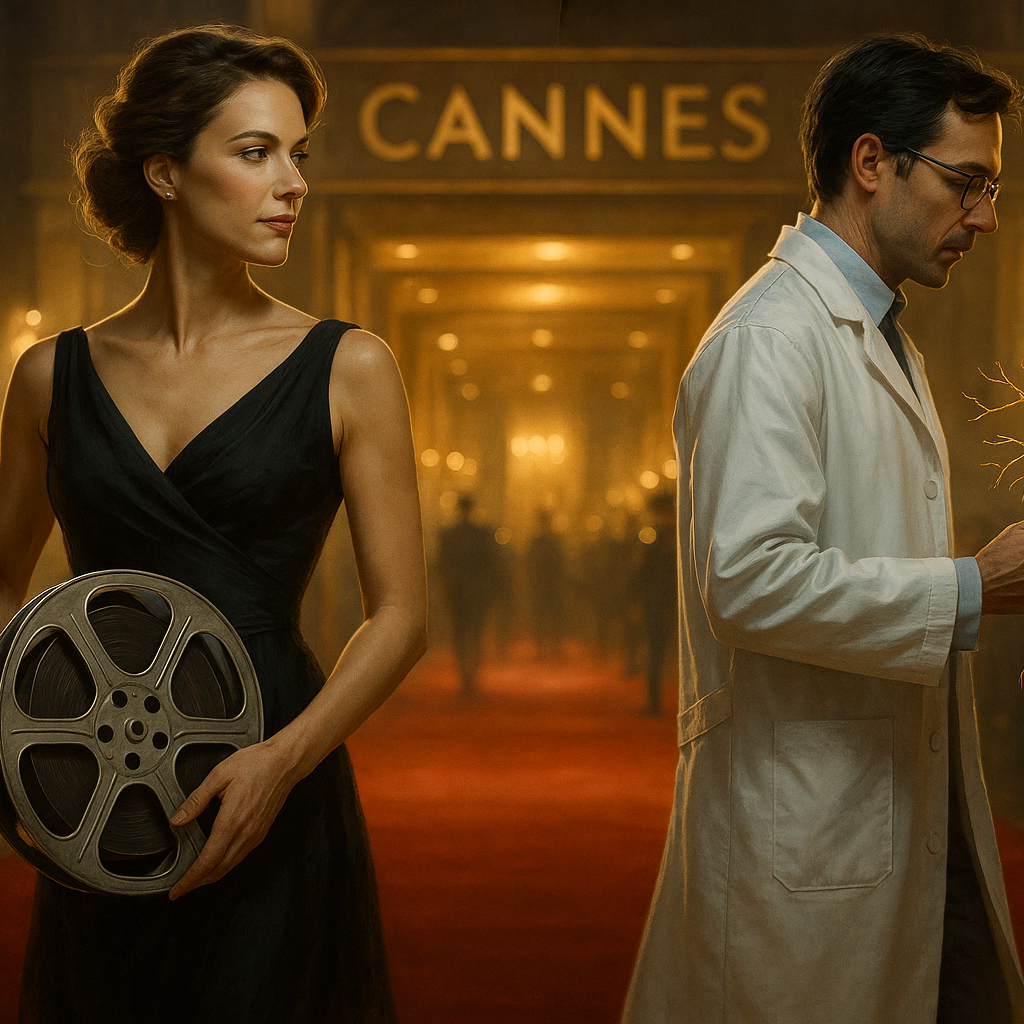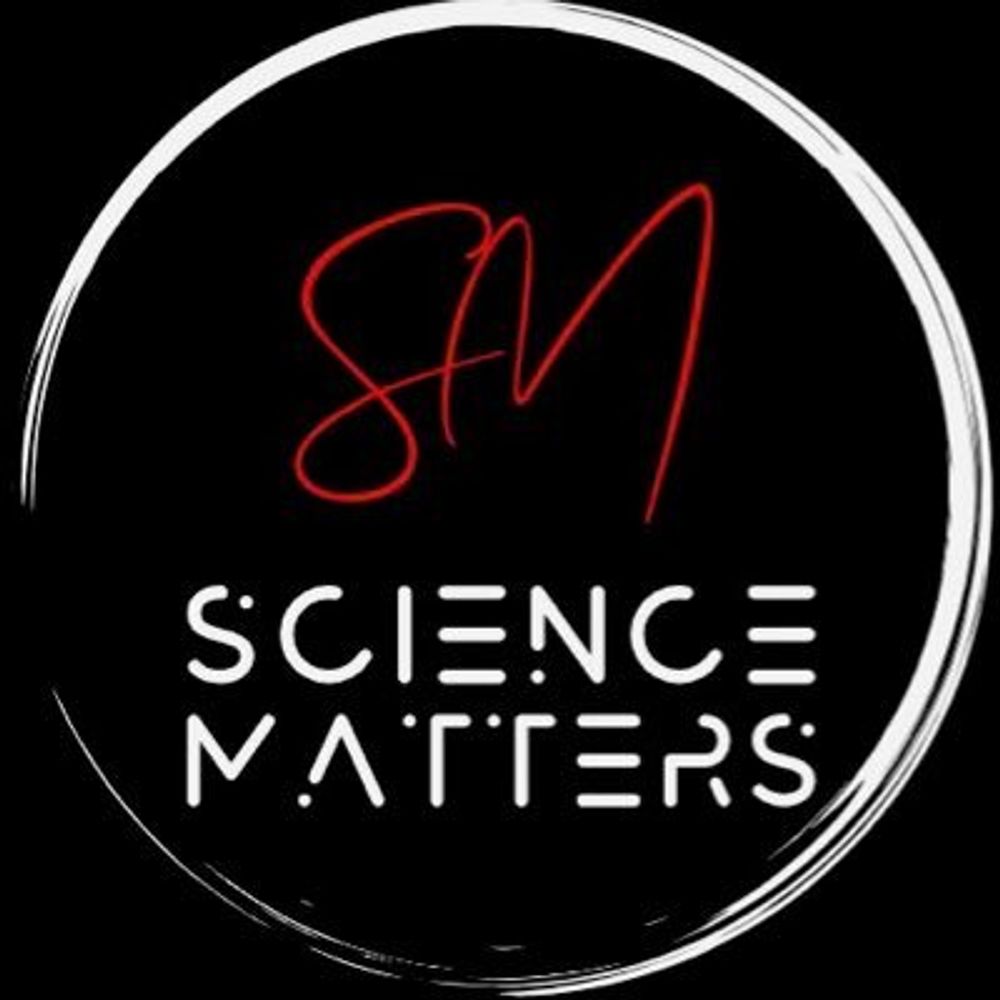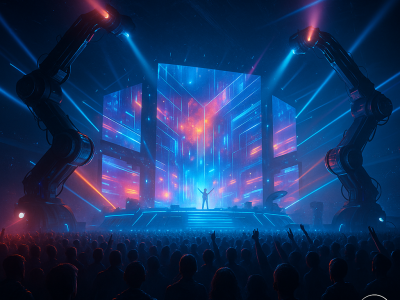Each May, the glittering town of Cannes transforms into the epicentre of cinematic prestige. With paparazzi flashes, designer gowns, and film premieres that dominate headlines, the Cannes Film Festival is often seen as a celebration of celebrity culture. But behind the spectacle lies something more profound—a quiet but growing fusion of science, technology, and social impact that’s beginning to shape the stories told on the silver screen.
The 2025 edition of Cannes was no exception. Among the glamour and glitter, films about climate migration, artificial intelligence, and mental health took centre stage. The red carpet, it turns out, isn’t just for stars anymore. It’s also where science takes a bow.
The emotional science of cinema
What makes a Cannes film move audiences to tears or ignite political debate? The answer lies in the brain.
When viewers experience a story, their brains engage in what scientists call “neurocinematic synchronisation”. Mirror neurons fire as characters express pain or joy. Dopamine and oxytocin—chemicals linked to reward and empathy—flood the system. Researchers at University College London recently showed how tightly edited narratives can increase emotional synchrony among viewers, creating a shared experience powerful enough to transcend culture or language.
This neurological ballet is no accident. Directors, editors, and sound designers use decades of psychological research to fine-tune every frame. Music cues manipulate tension. Camera angles trigger subconscious power dynamics. Every detail is calibrated to hijack the brain’s response system.
At Cannes, these techniques become tools for persuasion, helping science-themed films reach beyond dry facts and into the realm of feeling.
Reel impact on real policy
Cinema is more than art; it’s a soft-power tool. Films premiering at Cannes have gone on to influence environmental regulations, public health policies, and educational reforms.
This year, a standout was Below the Floodline, a documentary by Dutch filmmaker Sanna Vos, which followed families displaced by saltwater intrusion in Bangladesh. Using drone footage, climate modelling, and personal testimony, the film paints a haunting picture of climate-induced migration. Since its debut, the film has been cited by UN water policy experts and picked up for screening at COP29.
Similarly, the French short Overdose, directed by Karim Aït Benhida, tackled the European opioid crisis using real hospital data visualised through animation. It featured the voices of physicians, researchers, and patients, merging artistic storytelling with scientific evidence. The film is already being discussed as a training tool for public health professionals across the EU.
These examples illustrate the growing role of “science cinema”—films grounded in real data, peer-reviewed research, and expert collaboration. And Cannes, with its global audience, offers the perfect platform to amplify their reach.
AI joins the writing room
One of the most talked-about topics at Cannes 2025 wasn’t a film, but an algorithm.
Echo Chamber, a dystopian thriller nominated for the Palme d’Or, made headlines not just for its story, but for its script, partially generated by artificial intelligence. The writing team fed scientific research on groupthink, social media psychology, and cognitive bias into a large language model, using its outputs as narrative prompts.
This isn’t just a gimmick. According to Dr Leena Sharma of the University of Edinburgh, who studies AI in creative arts, AI tools are increasingly being used to simulate dialogue, generate realistic plot trajectories, and test audience reactions before a film is even made. Filmmaking is evolving, blending computational models with creative instinct.
But this innovation comes with ethical challenges. Who owns an AI-generated script? Can AI unintentionally reinforce biases in its storytelling? As these questions emerge, Cannes has become a forum for debating not only art, but the future of authorship.
Making Cannes greener
The film industry’s environmental footprint has long gone underreported. From transcontinental travel and massive lighting rigs to set construction waste, film festivals like Cannes aren’t exactly low-carbon affairs.
But 2025 marked a shift. This year, the organisers launched the “Green Reel” initiative, aimed at making Cannes the most sustainable film festival by 2030. Solar-powered screening areas, plant-based catering, and carbon offsets for every guest flight were among the measures introduced.
Filmmakers are also stepping up. An independent report from the University of Lausanne showed that films shot under green production protocols had 40% lower carbon emissions compared to conventional methods. The 2025 documentary Frames of Earth, directed by Brazilian ecologist-turned-filmmaker Ana Lemos, was produced entirely using solar power and recycled materials. It became the first carbon-neutral film ever screened in the festival’s history.
As climate change becomes both subject and backdrop, sustainable filmmaking is no longer a fringe concern—it’s a front-row issue.


Mental health takes centre stage
Another theme that dominated Cannes this year was mental health, particularly among young people and researchers.
The Polish film Blue Light portrayed the burnout of a young PhD student researching atmospheric pollution. Shot in dim laboratory corridors and smog-choked cityscapes, the film was inspired by real interviews conducted at the University of Warsaw. It highlighted rising cases of depression and anxiety in academia—a topic gaining international attention.
This narrative struck a chord with many scientists and students attending the festival. For the first time, Cannes hosted a panel discussion on “Mental Health in Research,” featuring psychologists, filmmakers, and early-career scholars. The consensus? Storytelling can help destigmatise mental illness, particularly in high-pressure scientific environments.
The neuroscience of storytelling
Science doesn’t just appear in films—it is film. Behind every compelling frame lies the logic of cognitive science and narrative psychology.
Dr Anna Westwood, a neuropsychologist from the University of Oxford, explains that good stories mirror how humans naturally process information: through causality, pattern, and emotion. Her team recently published a paper in Nature Human Behaviour demonstrating how narrative structure affects memory encoding in the brain. People are more likely to remember information embedded in a story than facts presented in isolation.
Filmmakers, knowingly or not, tap into these principles. Cannes, by curating narratives that balance intellect and emotion, becomes a living experiment in science communication.
From fiction to foundation
It’s easy to dismiss Cannes as pure spectacle, but the festival plays a subtle role in shaping scientific discourse.
Several of the films featured in 2025 were produced in collaboration with research institutions. The German entry Synthetic Eden, which explores bioengineered ecosystems, was co-developed with the Max Planck Institute. Likewise, the VR documentary Inside the Neuron was created with researchers from KU Leuven and provides a fully immersive journey through a firing brain cell.
These partnerships reflect a broader trend: the rise of research–cinema collaborations. As funding agencies begin to see the value in film as a dissemination tool, more labs are partnering with filmmakers to translate complex science for the public.


Changing who tells the story
Representation in science films is slowly improving, though Cannes still faces criticism for lack of diversity. This year, notable strides were made: more women-led science documentaries were submitted than ever before, and Indigenous voices were amplified in climate-themed films from Australia and Canada.
Yet, structural barriers remain. Dr Farah Mbeki, a Kenyan anthropologist and filmmaker, noted during a panel that “Science communication must stop being a colonial export. We need storytelling from the Global South—not about it.”
Cannes may still be dominated by the Global North, but its growing openness to diverse voices suggests a shift in how—and by whom—science is portrayed on screen.
Cannes and the climate of now
In 2025, the intersection of cinema and science feels more urgent than ever.
With climate protests erupting outside festival venues, AI debates unfolding on stage, and films addressing everything from pandemic trauma to soil microbiomes, Cannes reflects not just the cultural moment but the scientific one. It reminds us that in an era of misinformation and polarisation, the most effective way to reach hearts and minds might not be through data—but through story.
Cinema, after all, does what graphs cannot: it breathes life into knowledge.
The final act
Science is not just conducted in labs or published in journals. It’s also performed in darkened theatres, whispered in dialogue, and projected onto massive screens.
As the Cannes Film Festival evolves, its role as a platform for scientific awareness, ethical debate, and emotional resonance continues to grow. The next time the red carpet rolls out, it might not just be for stars—it might be for the future of science itself.
Will the storytellers of tomorrow be scientists, or will scientists become the storytellers?
References
- Hasson, U., Landesman, O., Knappmeyer, B., Vallines, I., Rubin, N., & Heeger, D. J. (2008). Neurocinematics: The neuroscience of film. Projections, 2(1), 1–26.
- UCL News. (2020). Films can synchronise viewers’ brain activity, say scientists. University College London. https://www.ucl.ac.uk/news/2020/aug/films-can-synchronise-viewers-brain-activity
- Nature Human Behaviour. (2018). Narrative structure in human memory. https://www.nature.com/articles/s41562-018-0307-2
- UN Water. (2024). Policy briefs on climate migration. https://www.unwater.org/
- ECDC. (2022). Opioids and related harms in Europe. European Centre for Disease Prevention and Control. https://www.ecdc.europa.eu/
- University of Edinburgh. (2023). AI and the Creative Industries. https://www.ed.ac.uk/
- University of Lausanne. (2024). Green filmmaking carbon audit. https://serval.unil.ch/
- APA Monitor. (2009). The dangers of groupthink. https://www.apa.org/
- Frontiers in Psychology. (2020). Cognitive biases in decision making. https://www.frontiersin.org/
- ScienceDirect. (2014). The impact of mental health storytelling. https://www.sciencedirect.com/




